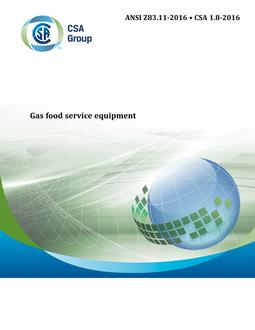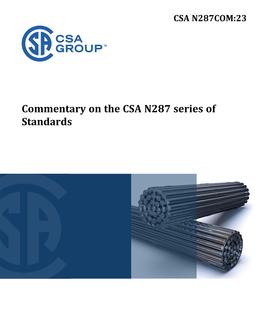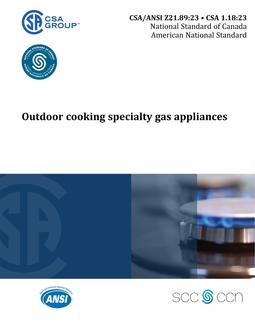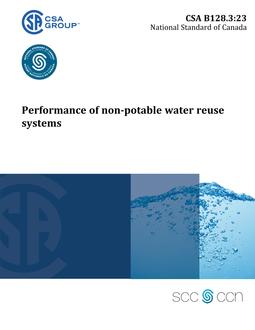
CSA ANSI Z83.11-2016/CSA 1.8-2016
- Comments Off on CSA ANSI Z83.11-2016/CSA 1.8-2016
- CSA
Preface
This is the fourth edition of ANSI Z83.11 — CSA 1.8, Gas food service equipment. It supersedes the previous editions published in 2006, 2002, and 1996.
Scope
1.1 This Standard applies to newly produced gas food service equipment providing coverage for ranges and unit broilers, baking and roasting ovens, counter appliances, deep fat fryers, kettles, steam cookers, steam generators, tableside cooking appliances (see Clause 3, Definitions), hereinafter referred to either (1) “appliances” constructed entirely of new, unused parts and materials for use in food service centers of commercial, industrial, institutional and public assembly buildings, or (2) “outdoor appliances” constructed entirely of new, unused parts and materials for outdoor use and/or for installation in either carts or trailers: a) for use with natural gas; b) for use with manufactured gas; c) for use with mixed gas; d) for use with propane gas; e) for use with liquefied petroleum gases (see Clause 5.2-e); f) for a tableside cooking appliance only, for use with butane gas; g) for use with LP gas-air mixtures; and h) for use with either natural, manufactured, or mixed gas and convertible (see Clause 3, Definitions) for use with either propane gas or liquefied petroleum gases. The construction of gas food service equipment for use with the above-mentioned gases is covered under Clause 4. The performance of gas food service equipment for use with the above-mentioned gases is covered under Clause 5. The construction of floor-supported and built-in food service appliances for use with the above-mentioned gases is covered under Clause 4. The performance of floor-supported and built-in food service appliances for use with the above-mentioned gases is covered under Clause 5. 1.2 Where specific type of equipment is involved, that product type (e.g., fryer) will be identified and underlined in the provision and will only apply to that product type. 1.3 This Standard also covers all electrical equipment, wiring, and accessories built in or supplied for use with an appliance. It covers only such appliances with electrical equipment, wiring, and accessories that are installed in accordance with the National Electrical Code, NFPA 70 or the Canadian Electrical Code, CSA C22.1, as applicable. 1.4 If a value for measurement as given in this Standard is followed by an equivalent value in other units, the first stated value is to be regarded as the specification. 1.5 All references to psi through this Standard are to be considered gauge pressure unless otherwise specified. 1.6 Outdoor appliances, carts, and trailers a) Appliances complying with sections of this Standard which specify outdoor appliances shall be marked per Clause 4.48, Marking. b) Appliances that are for use with a self-contained LP-gas system shall comply with Clause 4.40, Self-contained LP-gas supply systems and Clause 4.41, Enclosures for self-contained LP-gas supply systems. c) Outdoor appliances also include appliances that are intended to be towed behind a vehicle. This Standard does not address the issues of road performance or Department of Transportation (Federal, State, Canadian, or Provincial) rules and regulations concerning trailers. d) A manufacturer shall supply adequate documentation to a testing agency that the trailer equipped with appliances meets applicable regulations and is eligible for titling and licensing. Listing by an approval agency to this Standard does not imply that the trailer complies with the necessary codes applicable to vehicles for use on highways, roads, or streets. e) This Standard also covers the permanent gas distribution system used in any cart or trailer that is being submitted for evaluation under this Standard. f) This Standard is not intended for appliances that are:
- i) for use in mobile structures with walls on all four sides and a permanent roof; ii) listed separately for mounting on a trailer or cart; iii) carts or trailers that are listed without appliances.
g) Carts and trailers shall only be investigated for gas supply system construction. 1.7 These requirements cover a portable tableside cooking appliance equipped with a self-contained butane gas fuel supply with inputs not greater than 15,000 Btu/Hr. The fuel cylinder is of the non-refillable type and has a maximum capacity of more than 4 fluid ounces (118 ml) but no more than 10 fluid oz (296 ml) of butane. The maximum capacity in pounds of water is 1.08 (0.49 kg). A tableside cooking appliance may employ no more than two fuel cylinders. The fuel cylinder is removable and replaceable in normal use. The butane fuel cylinder shall comply with DOT 2P or 2Q requirements and be listed to the Standard For Non-refillable (Disposable) Type Metal Container Assemblies For Butane, UL 147B. These portable tableside cooking appliances are for use by commercial restaurants and may be used indoors, outdoors, or both. They are not for household use. 1.8 A tableside cooking appliance may employ a low pressure gas delivery system or may incorporate a delivery system operating directly from the self-contained tank supply. 1.9 Annex A contains items that are unique to the United States. 1.10 Annex B contains items that are unique to Canada. 1.11 Clause 2 contains a list of standards specifically referenced in this Standard, and sources from which these reference standards may be obtained. 1.12 Special construction provisions applicable to an appliance convertible for use with natural gas and liquefied petroleum gases are outlined under Clauses 4.9.3, 4.14.1, and 4.48.3-h(3). 1.13 Special construction provisions applicable to an appliance designed for use with an optional listed conversion kit are outlined under Annex C, (Optional) Provisions for listed gas appliance conversion kits. 1.14 In this Standard, “shall” is used to express a requirement, i.e., a provision that the user shall satisfy in order to comply with the standard; “should” is used to express a recommendation or that which is advised but not required; and “may” is used to express an option or that which is permissible within the limits of the standard. Notes accompanying clauses do not include requirements or alternative requirements; the purpose of a note accompanying a clause is to separate from the text explanatory or informative material. Notes to tables and figures are considered part of the table or figure and may be written as requirements. Annexes are designated normative (mandatory) or informative (non-mandatory) to define their application.
Product Details
- Edition:
- 4th
- Published:
- 02/01/2016
- ISBN(s):
- 9781488301230
- Number of Pages:
- 196
- File Size:
- 1 file , 5 MB



